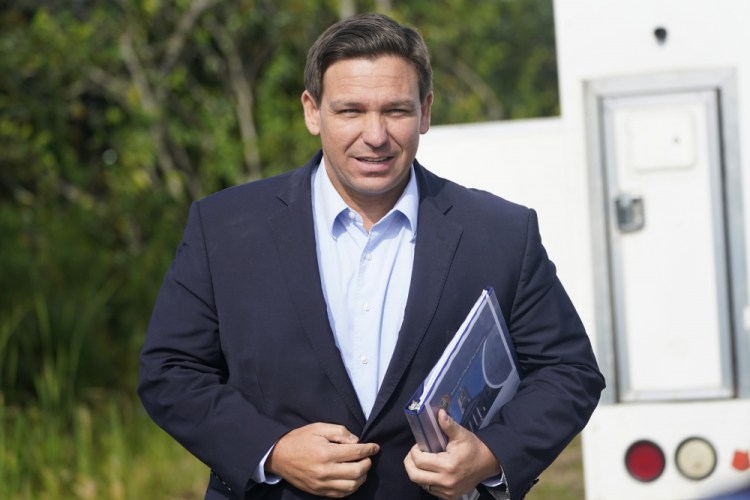The battle waged by Florida Republican Gov. Ron DeSantis against mask and vaccine mandates is facing challenges on multiple fronts.

Florida Gov. Ron DeSantis arrives at a news conference Tuesday in Miami. Wilfredo Lee/Associated Press
His ban on vaccine passports was temporarily blocked by a federal judge late Sunday: Norwegian Cruise Line was cleared to require coronavirus vaccines for guests and crew members after U.S. District Judge Kathleen Williams granted the company a preliminary injunction, blocking a Florida law championed by DeSantis that would have fined the cruise company for requiring vaccines.
Coronavirus protocols in schools are also in the spotlight as the head of the country’s second-largest teachers union on Sunday shifted course to signal support for vaccine mandates for teachers to protect students, especially those under 12 who are not old enough to be inoculated.
And a group of parents of disabled children in Florida sued Friday to block the state’s ban on mask mandates in schools. Florida education officials moved the same day to give students access to a state voucher program that helps pay for private tuition if their public schools require masks – an acknowledgment that some schools in the state are moving ahead with mask mandates despite the law.
DeSantis has rejected coronavirus restrictions or mandates as a greater threat than rising infections fueled by the highly transmissible delta variant. Florida is the epicenter of a summer coronavirus spike in the United States, recently reporting a fifth of all new U.S. infections and current hospitalizations.
DeSantis’s office did not immediately respond to a request for comment.
The pressure from courts, schools and companies leaves an uncertain path forward for how coronavirus policies could play out in Florida. Norwegian Cruise Line asked for the preliminary injunction in a lawsuit last month, arguing that without the temporary block, the company would “find itself either on the wrong side of health and safety . . . or else on the wrong side of Florida law.”
Randi Weingarten, president of the 1.7 million-member American Federation of Teachers, said on NBC’s “Meet the Press” that “we need to be working with our employers, not opposing them, on vaccine mandates.” The union this week will “reconsider” its stance that supported only voluntary vaccinations, she said.
Elsewhere, an Arkansas judge on Friday temporarily blocked the state from enforcing its ban on masks for government entities amid a rising number of cases and hospitalizations. Lawmakers had put a prohibition in place in April. The mask ban is being challenged by two lawsuits, including one from an east Arkansas school district where more than 900 staff members and students are quarantining because of a coronavirus outbreak.
On Sunday, America’s top infectious-disease expert, Anthony S. Fauci, said the United States would probably soon begin administering booster coronavirus vaccine shots to Americans with compromised immune systems. Countries such as Germany, France and Israel have pledged to give booster shots to some vulnerable citizens.
“People who have [transplants], people who are on cancer chemotherapy, people who have immune mediated diseases that require immunosuppression. . . . We need to look at them in a different light,” Fauci said on CNN. “We will almost certainly be boosting those people before we boost the general population that’s been vaccinated.”
He gave no definitive time frame but added: “We should be doing that reasonably soon.”
For generally healthy people who have been vaccinated, Fauci said that health experts would continue monitoring “very carefully” how well vaccine protections last before making any final decision on booster shots. The World Health Organization last week called for a moratorium on booster shots through at least September as poorer nations struggle to give first shots to even small fractions of their populations.
In a move that has gained national attention, San Francisco said Friday it would begin to “accommodate special requests” from those who have taken the Johnson & Johnson single dose vaccine to receive “a single supplemental dose with an mRNA vaccine” such as those developed by Modern or Pfizer with German partner BioNTech. But they must consult first with a health-care provider.
“This is an accommodation that is expected to be of interest to a small minority of J&J vaccinees,” the San Francisco Department of Public Health said in a statement. The position aligns with CDC guidance that “the need for and timing of COVID-19 booster doses have not been established and are not recommended at this time,” the department said.
Fauci, speaking on NBC on Sunday, said he was hopeful that the Food and Drug Administration would grant full approval to the Pfizer-BioNTech coronavirus vaccine by the end of August. The FDA has so far granted only emergency-use authorization for the Pfizer-BioNTech, Moderna and Johnson & Johnson vaccines.
Copy the Story LinkSend questions/comments to the editors.



Success. Please wait for the page to reload. If the page does not reload within 5 seconds, please refresh the page.
Enter your email and password to access comments.
Hi, to comment on stories you must . This profile is in addition to your subscription and website login.
Already have a commenting profile? .
Invalid username/password.
Please check your email to confirm and complete your registration.
Only subscribers are eligible to post comments. Please subscribe or login first for digital access. Here’s why.
Use the form below to reset your password. When you've submitted your account email, we will send an email with a reset code.